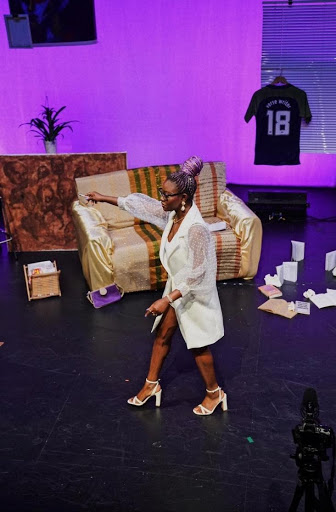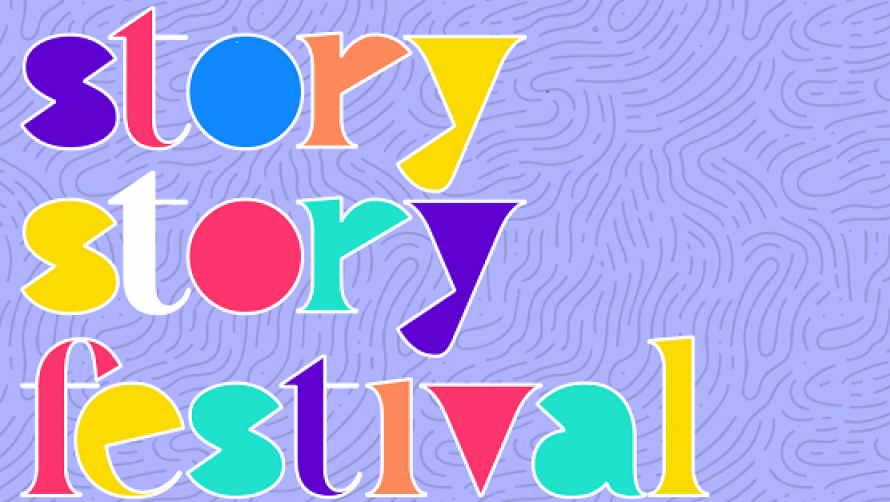Written by Anita Slater (@Anitascribbles @heyitsanitainwonderland)
As soon as I start chatting to Lanaire for our interview I am immersed in feelings of nostalgia, thinking of university years and pre-pandemic life. The last time we spoke I interviewed the playwright, poet and performer for a research project for my final year when we were both Sociology students. Now I’m thrilled to chat with her about her upcoming storytelling festival ‘story story‘ and I feel that familiar rush of past knowledge and discussion collide with the present.
 These unities between past and present are what have characterised much of Lanaire’s creative work, where her focus leans towards accessing and playing with memories. As we begin our discussion, you can quickly feel how much attention Lanaire gives to critically engaging with memory work, as she asserts that ‘stories will always live on’, the memory of her ‘bedtime stories’ told by her mum during her youth spent in Nigeria ‘stretched the imagination’, and sparkled a passion to capture and shape memories into performance or prose. Later, she would engage with childhood fables, experiences of youth, and the work of Black Feminist poet and theorist Audre Lorde in her play ‘an evening with verse writer’ that gained the 2019 Shoot Festival Development Award. She has also published a collection of poetry called ‘Of Ivory and Ink’ that engages with themes such as Nigerian feminisms and visual memory.
These unities between past and present are what have characterised much of Lanaire’s creative work, where her focus leans towards accessing and playing with memories. As we begin our discussion, you can quickly feel how much attention Lanaire gives to critically engaging with memory work, as she asserts that ‘stories will always live on’, the memory of her ‘bedtime stories’ told by her mum during her youth spent in Nigeria ‘stretched the imagination’, and sparkled a passion to capture and shape memories into performance or prose. Later, she would engage with childhood fables, experiences of youth, and the work of Black Feminist poet and theorist Audre Lorde in her play ‘an evening with verse writer’ that gained the 2019 Shoot Festival Development Award. She has also published a collection of poetry called ‘Of Ivory and Ink’ that engages with themes such as Nigerian feminisms and visual memory.
Now, Lanaire wants to share her passion for telling stories with other story makers. Her festival story story is a ‘three-day digital festival comprising commissions, workshops and films. The festival aims to amplify the voices of emerging writers, poets, and theatre makers, while equipping them with the knowledge and skills needed to share their stories with the world.’ The emphasis on a variety of mediums and working together as storytellers comes at a perfect time when hope and accessibility are in short supply, and more attention needs to be drawn to creating spaces for marginalised and unheard writers. The festival will run on the 5th, 6th, and 7th of February 2021.
The origin of the phrase ‘story story’ comes from Lanaire’s memory of a group activity as a child, where one person would ask ‘story story?’ and others would respond ‘story’. This immediately cements storytelling as a collective experience and blends the storyteller and the viewer or the listener.
When I asked Lanaire how she sees the relationship between storytelling and listening, between audience and creator, she emphasised her Black Feminist methodology that centres on the ‘co-production of knowledge’ and the importance of seeing that ‘knowledge is everywhere’. For example, she discusses how her mum ‘wouldn’t consider herself a storyteller’, and yet her earliest formations of dreaming and writing her own stories were those her mum shared with her before going to sleep.
This led us to a discussion about the strange or uncanny nature of creating knowledge, Lanaire asserting that ‘knowledge is produced in the weirdest spaces’. Places often not considered spaces of knowledge, such as bathrooms, bedrooms, or knowledge extracted from half-memories and anecdotes or tales. This emphasises precisely the necessity to move away from labels and ideals of what being a storyteller should be. As Lanaire states, there is a ‘hierarchy between oral forms of knowledge and written forms of knowledge’. She has tended towards a practice of reclaiming these spoken forms of passing knowledge on, inspired by Yoruba cultural traditions. Her festival, which chose four commissions out of a selection of domestic and international submissions from Black story makers aims to centralise learning different modes of storytelling and sharing them, engaging in films, visual art, plays, poetry, writing. 
The digital aspect of the festival, which intended to be digital regardless of pandemic conditions, allows for knowledge Lanaire characterises as ‘across borders’. The festival creates an interaction of mediums and spatial boundaries, ‘a distillation of experience’, as Lanaire states, borrowing from Audre Lorde’s enduring words in ‘Poetry is not a Luxury’.
When I ask how Lanaire’s feminism has shifted or changed since our discussion in 2019, she says that she puts more of an emphasis on ‘seeing the importance of collective care’ in her work now. This is a highly prescient addition to her methodology, where community and caring for each other is more important than ever as we are limited to domestic zones and online contact. Reaching out to each other both through daily lives and through creative networking can help extend the perimeters that feel so insulated right now.
Lanaire says that this time has also prompted her to care about her relationship to her knowledge production as well, to ‘sit with it’ and really feel the process of digesting her experiences and embodying them. She feels it is important we become ‘more compassionate’ in these times. I think her festival is the perfect characterisation of this through its commitment to forming spaces where people can comment on and build on each other’s work. Lanaire emphasises the need to ‘notice’, not just with the eye but through the senses, to awaken creativity, feel it. She discusses how she has taken to self-reflection after her performances based on the advice of one of her teachers Dr Claire French from the University of Warwick, who recommends critical engagement post-performance.
Ultimately, ‘story story’ is inserting itself into an industry that has long sidelined both international creativity, and Black creatives in Britain. The festival aims to bring together and strengthen sidelined stories, bringing them into the centre, then expanding this knowledge out to others, creating an elastic mix of multiple mediums. As Lanaire states, the festival hopes to work in ‘subverting the gatekeeping in the industry’ and spark a future of knowledge production based on integrated experiences that transcend boundaries of time, space, and established forms of knowledge.
Tickets for the festival’s events can be found here: http://storystoryfestival.lanaireaderemi.co/ and to check out Lanaire’s portfolio click here: http://lanaireaderemi.co/

